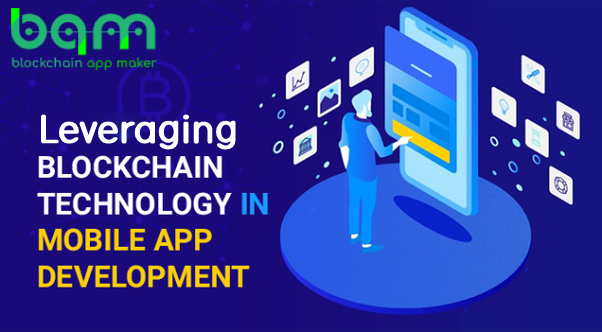
This post will begin by discussing the potential of mobile applications as well as blockchain technology. The figures for mobile apps and blockchain technology in 2020 are as follows:
The market share of blockchain technology is expanding at a rate of more than 34% CAGR.
The mobile application market is anticipated to expand at a rate of more than 19 percent compound annual growth.
Utilizing blockchain technology has already begun to assist numerous businesses. Due to the poor performance, there are certain worries in the mobile application sector. So, is it viable to use mobile applications to exploit blockchain technology?
The decentralized and secure ledger provided by blockchain technology can address issues with power, user experience, and performance of mobile applications. By using blockchain technology, it is possible to provide customers a “Wow” experience. Numerous industries are making use of the enormous capacity of blockchain technologies, including healthcare, education, real estate, IT, and others.
This post will go through how to use mobile applications and blockchain technology to maximize your investment.
Strategies for Using Blockchain in Mobile Applications
Here are some examples of how blockchain can be used with mobile apps:
1. Provide An Advanced Digital Ledger System
Numerous servers, networks, and systems make up the mobile application network. In most cases, the server receives requests from the client and responds with the requested data. Remember that large mobile applications may receive millions of requests per second, placing a heavy burden on servers.
The issue of excessive server stress has a perfect answer thanks to blockchain technology. It offers a decentralized digital ledger system that works together to efficiently analyze data and reply to numerous queries. Here, the intricate ledger system comes into play since it will make sure that each machine updates its records once the transactions are safe. It won’t permit the data to be tampered with.
2. Increase Security Levels in Mobile Apps with Multiple Users
The smartphone application is not as simple to use as it was when it initially entered the market. Multiple user access is one of many things that modern mobile apps need to handle. The application needs to ensure that there is minimal to no danger of unauthorized access. It must be protected against information tampering, alteration, and misuse.
Since nothing can be done without encryption and decryption keys, the blockchain technology makes it virtually difficult for users to hack the system. The information is recorded on the server and can only be changed after user authentication. The entire transaction involves no middlemen, which makes it extremely safe. This means that even if numerous users have access to a single program, there won’t ever be a problem.
3. Enhanced Transparency And Security in the Development Environment
When there is a system crash, it is difficult for developers. When they try to identify the bugs after the system crash, they are completely lost. Due to the millions of requests that are made every second, the engineers are unable to monitor all real-time issues and errors. Before the problem is discovered by developers, the malware may do serious damage.
This issue has a perfect solution in blockchain technology. Its translucent form can aid in avoiding and preventing these kinds of attacks. The information may be easily tracked by users thanks to blockchain technology. The system cannot be tampered with by unauthorized users because data changes require verification.
Developers can maintain control over domain records thanks to the collection of DNS entries. Unless developers give the go-ahead, no one will be able to change the entries.
4. Innovation And Continuous Improvement
Since blockchain technology is still in its early stages, there will likely be a lot of updates in the near future. In ten years, blockchain technology will have gone beyond what it is today.
What does this have to do with applications for mobile devices? Well, many mobile apps now include blockchain technology as a necessary component. One might anticipate significant innovation in the mobile applications themselves as a result of developments in blockchain technology.
Blockchain technology is currently undergoing significant developments that will improve its dependability and efficiency. It implies that mobile apps have a promising future and will get additional advantages from using blockchain technology.
5. Simplify the Process For Approval And Updates
Apple’s App Store and Google Play both manage all the updates independently. They can complete the upgrade process without assistance from a third party. When their apps are rejected for unexpected reasons, developers may become perplexed due to the unclear quality assurance policies.
The blockchain is a thankfully open-source technology. The developers are able to monitor the approval procedure thanks to it. Additionally, it offers a system for developer reputation that is directly related to the public ledger. When uploading their apps, developers do not need to worry about numerous viruses and malware. When an app is uploaded to the system, the blockchain technology will automatically check it for infection.
It briefly keeps the application for human inspection after scanning it. It then confirms it afterwards. In a few hours, the app will finally be available for download.
6. Address Economic Issues
By way of in-app purchases or adverts, the app store robs creators of at least 30% of their revenue. Keep in mind that this sum of money is really large. A few CPI packages will cost the developers money, which is also not cheap.
Additionally, while offering in-app purchases, the developers must deal with a variety of fees, including those associated with credit cards and banking operations. The developers are not benefiting from the monetization.
When it comes to addressing economic issues, blockchain technology is revolutionary. Through a blockchain smart contract, developers may reward customers for using their apps for a predetermined amount of time without the help of a middleman. A CPA (Cost per Attention) advertisement model might help the developers recoup a significant amount of their investment.
Users can spend coins they’ve earned to make purchases in-app later. Additionally, instead of only keeping 70% of the profit, the developers get to keep about 85% of it.
7. Access Remote Areas
Nowadays, a growing number of people in rural areas have access to smartphones and mobile applications. However, they struggle to provide streamlined banking and credit services. Even those who simply have access to the internet will find it simpler to conduct online transactions thanks to blockchain technology.
The inhabitants of remote places can keep coins in their online wallet rather than utilizing a credit card or bank account. They would be able to easily complete eCommerce purchases, apply for the loan, and transfer money to their loved ones thanks to it.
The Final Conclusion
In its early stages, blockchain technology was often used to refer to cryptocurrencies. However, its potential has grown beyond only being useful for cryptocurrencies. Transparency, automation, the removal of intermediaries, security, and other benefits of blockchain technology have already begun to revolutionize a number of industrial processes.
For both developers and users, the integration of blockchain technology with mobile applications has been a fantastic experience. Anyone who is able to use mobile apps with blockchain technology to create products has the ability to give the market a lot of value.


